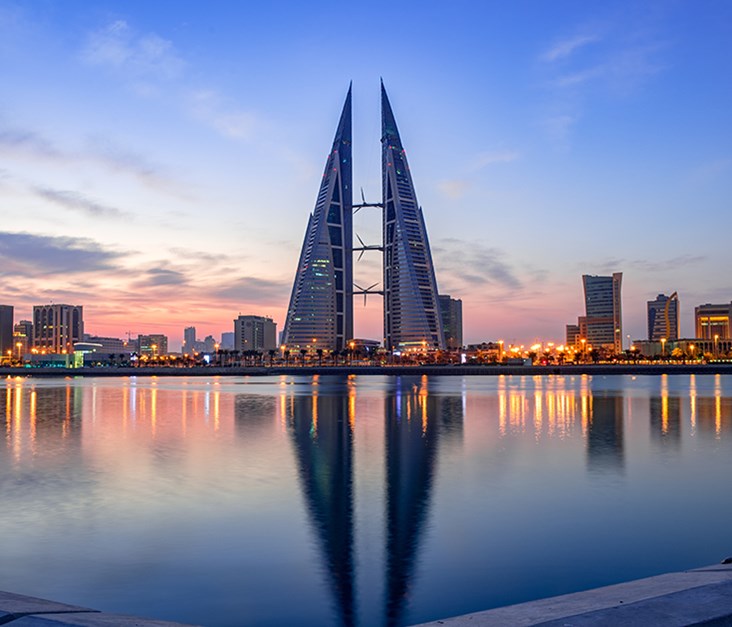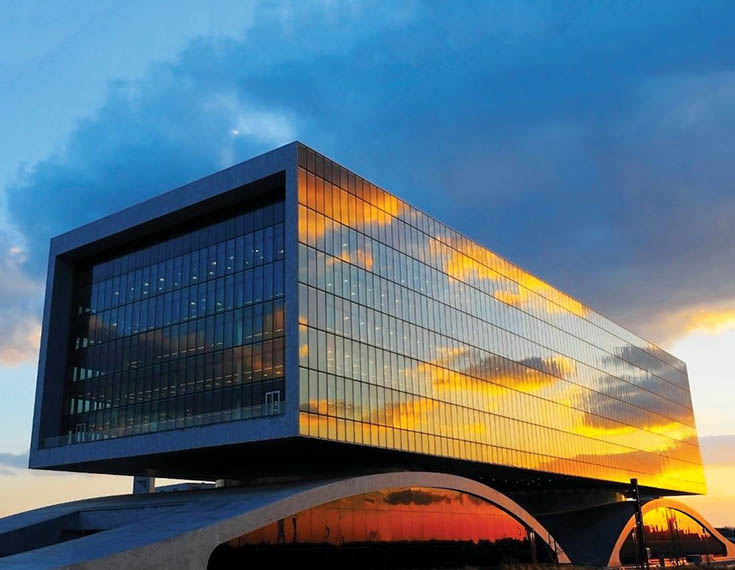
In 1932, Bahrain was the 1st country in GCC to discover oil; however, in the wake of oil price drop in late 2014 and the succession of economic disruptions, the country has proven itself to be resilient enough. Having geared its efforts over the past 15 years towards diversifying its economic activity, Bahrain is adopting a progress and forward-thinking strategy to shift towards a digital economy, all of which is possible with the efforts of Bahrain’s Economic Development Board (EDB).
We sat down for a chat with Dr. Simon Galpin, EDB’s Managing Director, and Pakiza Abdulrahman, head of Startups and Business Development at EDB, in order to get a clearer image of the Kingdom’s ecosystem and EDB’s efforts to develop its industries.
The purpose of an economic development board is to guide each new or expanding company –whether small or large, through every part of the process. EDB can help you benefit from Bahrain’s business infrastructure, find a location for your business, discover talent, and navigate any legal requirements.
“When a startup starts or enters the market in Bahrain, one of our colleagues will actually account manage them through the whole process, even if that takes several years.” Dr. Simon explained. “We act as the startups’ consultants. We insure they get help from the right people, at the right time, taking them through their journey right away.”
Bahrain’s entrepreneurial ecosystem is also in notable activity: Tamkeen has invested $1B in Bahraini ventures; Startup Bahrain is creating a resourceful environment where startups can grow; Amazon Web Services announced opening their 1st office in the Kingdom, “We want to capitalize on the opening of Amazon Web Services’ 1st major data region in the summer by really working with accelerators, such as C5 Accelerate, to encourage software service and cloud technology in Bahrain.”
.jpg)
Rise of Bahrain’s Fintech Industry
Bahrain has been climbing the Fintech ladder to become one of MENA’s Fintech hubs. The Kingdom’s innovative initiatives in its financial services sectors have revealed its goal of becoming a Fintech powerhouse with $6.47B being the projected value of Bahrain’s Fintech industry in 2020, according to EDB.
The industry was propelled forward when Bahrain Fintech Bay was founded back in 2017. It is a dedicated Fintech co-working space aimed at bringing the full spectrum of financial market participants and stakeholders together. Fintech startups which join this network receive access to meeting rooms, innovation labs, acceleration programs, curated activities, and educational opportunities.
As Simon put it, “if you’re a Fintech, it is very easy to bring talented people in due to Bahrain’s mature financial services industry. Many of the country’s experts that have decades of financial service experience are available to come and help your startup.”
Bahrain also focuses on building and strengthening its whole ecosystem around Fintech through talent and skill development. EDB has recently launched an initiative “that empowers Bahrainis and subsidizes training and certification in Fintech through international institutions” according to Pakiza. “There’s also a program that supports local talent to travel abroad, have international experience in different Fintech hubs globally, and come back to the country with that experience to enrich the ecosystem.”
Apart from that, the country has set out to represent women in Fintech who are driving and shaping the ecosystem. This initiative encourages more participation of the female entrepreneurs and policy makers to come on board and achieve gender balance in the industry.
Bahrain is also the host for Amex Middle East Operations, which works very closely with Fintech startups and accelerators. Pakiza said, “This partnership facilitates their introduction to new portfolio services, solutions, and added value experience to their clients. We’re also seeing more and more collaboration between the private sector and the startups in Bahrain.”
2017 also witnessed the introduction of an onshore regulatory sandbox by the Central Bank of Bahrain (CBB). The virtual space created by a facilitated and developed framework provides a safe area in which Fintech businesses (both established and startups) can test and refine their technology-based innovative products, services, and platforms without being immediately burdened by the usual regulatory and financial requirements which would otherwise apply to their activities. The introduction of the regime positioned the Kingdom as only the 2nd state within the Gulf Cooperation Council to implement such a framework after UAE’s Fintech Hive.
“Startups operating in the sandbox are regulated by the Central Bank for the duration of 9 to 12 months.” Simon elaborated. “They are not restricted however to only doing business with other companies in that special economy. From day one, startups can work with anyone whether they are Bahraini consumers or companies.”

Reforming Regulations
Bahrain is working relentlessly to promote itself as a business location and make its regulations as business friendly as they could be. The government recently implemented a “cloud first” policy to encourage government entities and businesses to use cloud services for technology solutions. Therefore, the country has implemented the eGovernment Strategy 2020 to reach that goal.
The journey to provide government services electronically was launched with the establishment of the eGovernment Authority in August 2007 by a Royal Decree which states that the authority follows the Council of Ministers and should aim at coordinating as well as implementing eGovernment programs in accordance with strategies, plans, and programs set by the Supreme Committee for Information and Communication Technology.
The 2020 eGovernment Strategy focuses on advancing the living standard by ensuring online transformation in the government services through the usage of ICT which would facilitate knowledge management and completion of businesses professionally, conveniently, and with low costs as well as ensure information security.
The vision of the strategy revolves around creating a strong, flexible and safe environment to encourage innovation in public services. This contributes in spreading the knowledge that enables officials to take decisions and develop more services in order to be easily completed with the lowest of costs.
“In just the last year, there have been so many new regulations that opened up the innovative sectors. To mention a few, we have implemented eKYC, improved refunding regulations, open banking, and cryptocurrency exchanges.” Noted Simon Galpin, “We also want to capitalize on the opening of Amazon web Services 1st major data region in the summer by really working with accelerators to encourage software service and cloud technology in Bahrain.”
Bahrain has also completed preparations to launch 5G mobile networks, putting it on track to be one of the 1st countries in providing commercial 5G services to consumers by the end of 2019 once devices are made available. Mobile operators in Bahrain have started rolling out the necessary network infrastructure.
This places Bahrain among the world’s leading countries in adopting the 5G technology and makes the Kingdom more appealing for companies that use the next-generation technologies such as autonomous vehicles and VR.
A Brighter Future for MENA

With the rapid development of technology, it is difficult to track the constant changes that occur in the startup ecosystem. As we neared the end of the sit down, Dr. Simon and Pakiza took some time to provide their expert opinions and predictions to what the region has in store for the Tech Sector’s future.
On the 26th of March, Uber announced its acquisition of MENA’s ride-hailing startup Careem for $3.1B putting the entire region on par with the global ecosystem.
Dr. Simon commented on this latest news saying, “This is an exciting time, and MENA is a very dynamic part of the world to be in. There are loads of challenges, but when I see, not just what we’re doing, but also what Kuwait, UAE and Saudi are doing and what you’re doing here in Lebanon; the pace of reform, the new laws that are coming out, the momentum is incredible. I think it’s more than any other part of the world and as our chief executive Khalid Rumaihi often says that the Arab world missed out on the 1st, 2nd and 3rd industrial revolution, but they are determined not to miss out on the 4th one. The Arab world wants to have ring sized seats when it comes to the next wave.”
Careem’s journey, from launch to exit, is one that all startups in the region aspire to achieve. Pakiza perfectly explained the formula of success that propels new-coming startups to the top of the chain:
“For new and growing startups, I would advise them to listen to their customers. Let’s take Careem as an example. The startup would have failed miserably if they had just imitated what Uber has done. What they have done perfectly well was seeing the dynamics of their market and providing a creative solution for such as cash options and subscription models. Localization and acculturalization are key for success in our region, so the more you know about your customer, the culture, the dynamics of your country and your consumers, the more likely you are to make an impact and to have a meaningful startup that is sustainable and that has potential to be acquired.”
Latest Business
Intelligence Report














